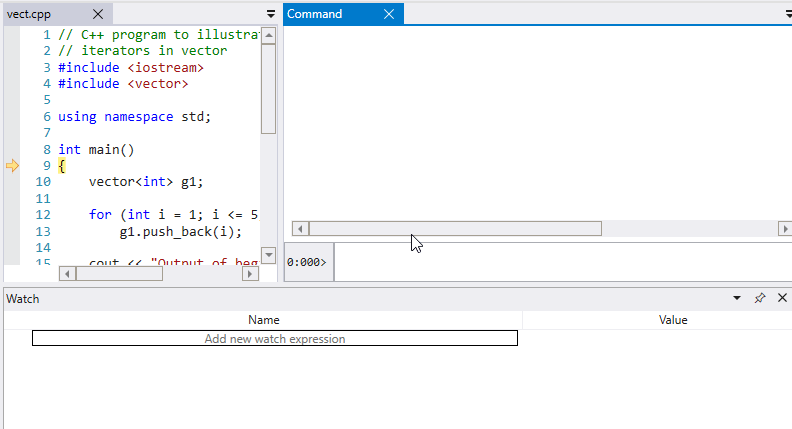Hello,
I am returning to WinDbg after a 10-15 year break so pardon me for the basic question. I do know the size of systemHandles.size() = 7. How can I see that in Windbg Watch Window? thanks
Hello,
I am returning to WinDbg after a 10-15 year break so pardon me for the basic question. I do know the size of systemHandles.size() = 7. How can I see that in Windbg Watch Window? thanks
@pgv i think there is a mail from me that is stuck in some queue
@santosh_kumar std::vector->size() is a function i dont think watch windows can evaluate function results
it can only typecast a memory location
you can do dx systemHandles.size() using the new natvis expression evaluator it will provide you the vector size
0:000> dv
g1 = { size=5 }
0:000> ?? g1
class std::vector<int,std::allocator >
+0x000 _Mypair : std::_Compressed_pair<std::allocator,std::_Vector_val<std::_Simple_types >,1>
0:000> dx g1.size() <<<<<<<<<<<<<<<<<
g1.size() : 5 <<<<<<<<<<<<<<<<<<<
0:000> dx -r 9 g1
g1 : { size=5 } [Type: std::vector<int,std::allocator >]
[] [Type: std::vector<int,std::allocator >]
[capacity] : 6
[allocator] : allocator [Type: std::_Compressed_pair<std::allocator,std::_Vector_val<std::_Simple_types >,1>]
[] [Type: std::_Compressed_pair<std::allocator,std::_Vector_val<std::_Simple_types >,1>]
[0] : 1 [Type: int]
[1] : 2 [Type: int]
[2] : 3 [Type: int]
[3] : 4 [Type: int]
[4] : 5 [Type: int]
the other day i was mucking around with some vectors in windbg and i happened
to unassemble the vector::size() function
looking at the disassembly and the crt src for the same function
i happened to realize that you can set a transparent expression in the watch window to look at the vector::size()
here is the disassembly of size() function for a vector in question
:000> x vect!std::vector<int,std::allocator<int> >::size
00007ff7`57cfa6f0 vect!std::vector<int,std::allocator<int> >::size (void)
0:000> uf 7ff757cfa6f0
vect!std::vector<int,std::allocator<int> >::size
[c:\program files (x86)\microsoft visual studio\2017\community\vc\tools\msvc\14.16.27023\include\vector @ 1703]:
1703 00007ff7`57cfa6f0 48894c2408 mov qword ptr [rsp+8],rcx
1703 00007ff7`57cfa6f5 4883ec38 sub rsp,38h
1704 00007ff7`57cfa6f9 488b4c2440 mov rcx,qword ptr [rsp+40h]
1704 00007ff7`57cfa6fe e8bca9feff call vect!ILT+16570
1704 00007ff7`57cfa703 4889442420 mov qword ptr [rsp+20h],rax
1704 00007ff7`57cfa708 488b4c2440 mov rcx,qword ptr [rsp+40h]
1704 00007ff7`57cfa70d e85a93feff call vect!ILT+10855
1704 00007ff7`57cfa712 488b00 mov rax,qword ptr [rax]
1704 00007ff7`57cfa715 488b4c2420 mov rcx,qword ptr [rsp+20h]
1704 00007ff7`57cfa71a 488b09 mov rcx,qword ptr [rcx]
1704 00007ff7`57cfa71d 482bc8 sub rcx,rax
1704 00007ff7`57cfa720 488bc1 mov rax,rcx
1704 00007ff7`57cfa723 48c1f802 sar rax,2
1705 00007ff7`57cfa727 4883c438 add rsp,38h
1705 00007ff7`57cfa72b c3 ret
windbg> .open -a 7ff757cfa6f0
and the relevent src code from crt sources
_NODISCARD size_type size() const noexcept
{ // return length of sequence
return (static_cast<size_type>(this->_Mylast() - this->_Myfirst()));
}
so basically if you set a watch expression like
systemHandles._Mypair._Myval2._Mylast - systemHandles._Mypair._Myval2._Myfirst
windbg will resolve the size() in the watch window (it will do the pointer arithmetic and display the actual size if you are wondering
how address x - address y each being 8 bytes wide result in 5
0:000> ?? g1._Mypair._Myval2._Mylast
int * 0x0000026f`5e0197a4
0:000> ?? g1._Mypair._Myval2._Mylast - g1._Mypair._Myval2._Myfirst
int64 0n5
0:000> ?? 0x0000026f`5e0197a4 - 0x0000026f`5e019790
int64 0n20
0:000> ?? ( 0x0000026f`5e0197a4 - 0x0000026f`5e019790 ) / sizeof(int)
unsigned int64 5
